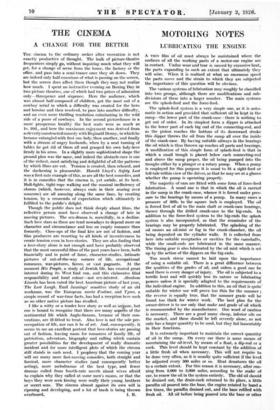Tim cinema to the ordinary seeker after recreation is not
exactly productive of thought. The bulk of picture-theatre frequenters simply go, without inquiring much what they will get, for a change of scene from the home, the factory or the office, and pass into a semi-trance once they sit down. They are indeed only half-conscious of what is passing on the screen, but the screen does affect them though they may not realize how much. I spent an instructive evening on Boxing Day in two picture theatres, one of which had two prices of admission only—threepence and sixpence. Here the audience, which was almost half composed of children, got the most out of a cowboy serial in which a difficulty was created for the hero and heroine and then resolved, to pass into another difficulty, and an even more thrilling resolution culminating in the wild ride of a posse of cowboys. In the second picturehouse in a more prosperous locality the best seats were as much as 1s. 10d., and here the maximiun enjoyment was derived from a cleverly constructed comedy with Reginald Denny, in which he became entangled with first one lady, then another, and finally with a stream of angry husbands, when by a neat turning of tables he got rid of them all and grasped his own lady-love firmly in his arms. In a slightly more sophisticated shape the ground plan was the same, and indeed the obstacle-race is one of the richest, most satisfying and delightful of all the patterns by which films are cut. Tension is created, then relaxed, and the slackening is pleasurable. Harold Lloyd's Safety Last wasa- first-rate example of this, as are all the best comedies, and it is in comedies that the cinema is, yet awhile, at its best. Bull-fights, tight-rope walking and the comical inefficiency of Clowns (which, however, always ends in their scoring over someone) are all amusing along the same lines, by creating tension, by a crescendo of expectation which ultimately is fulfilled to the public's delight.
Though the public does not think deeply about films, the .reflective person must have observed a change of late in moving pictures. The sex-drama is, mercifully, in a decline. Such love stars as there are tend nowadays to depend more on character and circumstance and less on empty romance than formerly. Close-ups of the final kiss are out of fashion, and • film producers are resorting to all kinds of inventiveness to 'create tension even in love-stories. They are also finding that a love-story alone is not enough and have probably observed that the most successful films of the past years have been, both financially and in point of fame, character-studies, intimate pictures of out-of-the-way corners of life, occupational romances, war-pictures, farces, or vast pageants. At the moment His People, a study of Jewish life, has created great interest during its West End run, and this elaborates filial responsibility and local colour—not sex-interest. Abraham Lincoln has been voted the best American picture of last year, The Last Laugh, Emil Jannings' sensitive study of an old workman, was the European sueds d'estitne, and Ypres, a :simple record of war-time facts, has had a reception here such as no other native picture has rivalled.
I like a witty or a tender love story as well as 'arc-pine, but one is bound to recognize that there are many aspens of the sentimental life which Anglo-Saxons, because of their con- ventions, are ill-fitted to treat. Also love is not the sole pre- occupation of life, nor can it be of art. And, consequently, it seems to me an excellent portent that love-stories are passing out of fashion, leaving room for romances of family life, of patriotism, adventure, biography and calling which contain greater possibilities for the development of really dramatic incident and for more intelligent plots of which the cinema still stands in such need. I prophesy that the coming year will see many more fast-moving comedies, both straight and farcical, more character studies (and consequently better acting), more melodramas of the best type, and fewer dramas culled from fourth-rate novels about wives afraid to explain why they called at some men's rooms, or that the boys they were seen kissing were really their young_ brothers or secret sons. The cinema almost against its own will is ripening and developing, and a lot of trash is being thrown










































 Previous page
Previous page